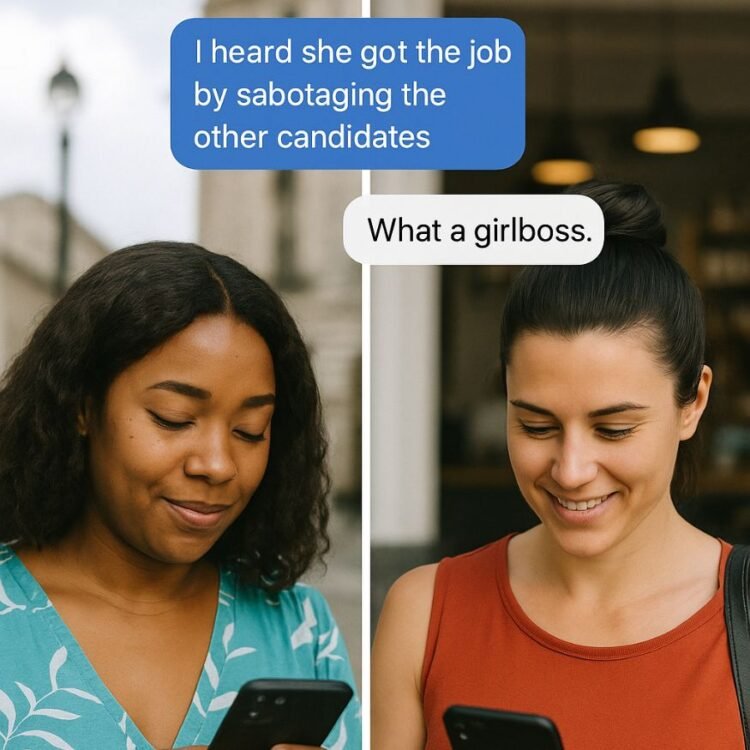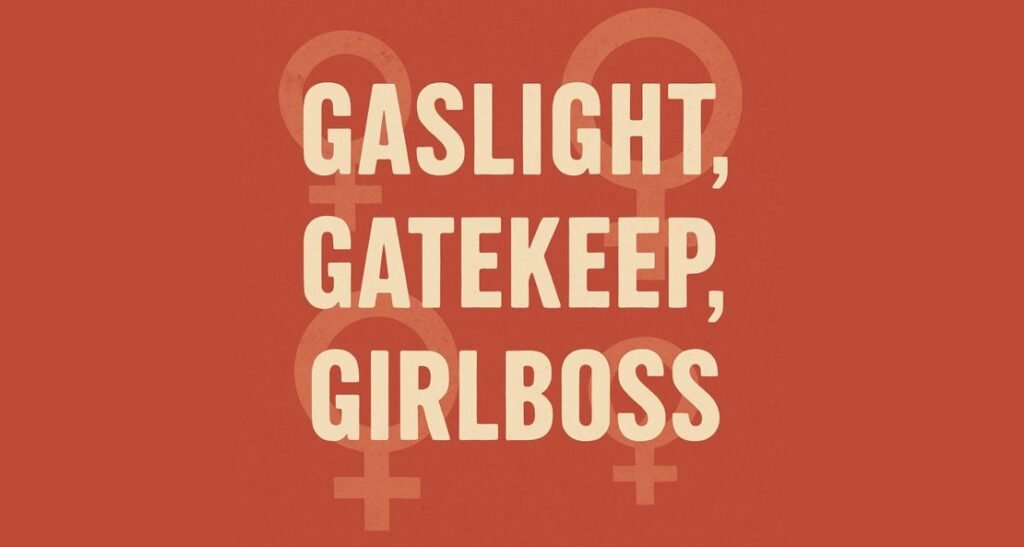A cultural dissection of the phrase that murdered corporate feminism with three little words
In January 2021, a Tumblr user named missnumber1111 posted what would become the death certificate for a certain brand of feminism: “today’s agenda: gaslight, gatekeep and most importantly girlboss.”
Within weeks, gaslight, gatekeep, girlboss spread like wildfire across social platforms.
What began as a throwaway joke became a scalpel, cutting through the hollow promises of corporate feminism.
The girlboss idea didn’t appear out of nowhere. It distilled years of frustration with feminism’s slide into glossy commercialism.
A movement that once challenged power structures now sells “empowerment” through pricey wellness retreats and #MondayMotivation posts.
The phrase flips that language back on itself and exposes its contradictions.
The Aesthetics of Ambition Gone Wrong
The brilliance of gaslight, gatekeep, girlboss lies in how it mimics those empty mantras.
Much like Live, Laugh, Love became shorthand for aspirational domesticity, this unholy trinity captures the murkier side of hustle-culture feminism.
It sounds like a self-help slogan but drips with irony.
Look at the order:
- Gatekeep means exclude others.
- Gaslight twists reality.
- Girlboss profits from the mess.
It’s a recipe for success that tastes toxic, which is exactly the point.
The phrase reveals how fast talk of empowerment can curdle into exploitation.
Its viral spread says a lot about generational shifts in feminism.
Where older feminists might have unpacked this through books and policy debates, Gen Z did it with three words that do the job and can be shared in seconds.
When Feminism Became a Brand

The gaslight, gatekeep, girlboss meme took off as real-life girlboss icons faced reckonings.
Sophia Amoruso’s Nasty Gal landed in court over discrimination claims, as Hollywood Reporter reported.
Away’s Steph Korey was accused of fostering a toxic workplace culture, covered in detail by The Verge.
The Wing, once touted as a feminist paradise, was unmasked for practising the very exclusions it claimed to fix.
None of these were one-offs. They pointed to something bigger: feminism had been rebranded as a product.
The movement that once fought for structural change now sold bite-sized solutions.
Want equality? Lean in. Want power? Start a side hustle. Want justice? Buy from women-owned shops.
No wonder the phrase struck a nerve.
It calls out how easily this glossy feminism demanded people ignore the obvious.
When women CEOs acted just like the worst male ones, critics were told they were betraying the sisterhood instead of pointing out the truth.
The Linguistic Architecture of Disillusionment

What makes this phrase so sticky is not just what it says but how it says it.
It uses alliteration to lodge itself in your brain like a jingle. Instead of selling you something, it dares you to see through the sales pitch.
The order matters. Gatekeep comes first, shutting people out. Gaslight keeps the lie alive, telling them they are imagining it. Girlboss tops it off with a shiny veneer, making it all look aspirational.
This is not just a reaction. It also predicts what happens next.
It gives people the language to spot the pattern before it fully takes hold.
Beyond the Punchline
The phrase’s power comes from how it names something many people felt but could not quite express.
It captures the exhaustion of being sold personal empowerment instead of real change.
It also hints at how capitalism absorbs and neutralises resistance.
If feminism can be packaged and resold, what can’t be?
Unlike traditional feminist theory, this meme doesn’t need pages of footnotes.
You see it. You get it. It works in the quick scroll of digital culture where big ideas must fit into a single post.
The Counter-Narrative
What’s clever about gaslight, gatekeep, girlboss is how it created its own flipside.
Manipulate, mansplain, malewife popped up as its masculine twin, proving these dynamics are structural, not just gendered.
It is a flexible framework that helps people spot exploitation in any context.
It also taps into bigger conversations about authenticity, especially for a generation who have watched social movements turned into hashtags and merchandise.
Black Lives Matter becomes a brand campaign. Pride turns into rainbow-tinted marketing. Feminism gets sold back as a lifestyle trend.
This meme works like a shield. It shows you know the game and you are not buying in.
Cultural Memory and Future Resistance
One of the sharpest things about gaslight, gatekeep, girlboss is how it acts as cultural memory.
It holds on to the lessons from early 2020s corporate feminism so they are not forgotten when the next empowerment fad comes along.
Once you can name a pattern, you are better equipped to resist it.
It is more than a meme now. Like jumping the shark or drinking the Kool-Aid, it is part of our shared language for spotting when empowerment talk is just window dressing.
It also echoes ideas in Audre Lorde’s The Master’s Tools Will Never Dismantle the Master’s House.
Lorde argued that you cannot rely on the same structures that oppress you to set you free.
The phrase reminds us that once you see the blueprint, you cannot unsee it.
The Uncomfortable Questions
Perhaps its biggest gift is how it forces the uncomfortable questions.
If the system is built to exploit, can anyone succeed inside it without doing harm?
If capitalism can hijack feminism, what resistance is left?
There are no neat answers. Maybe that is why the phrase sticks around. It does not claim to fix the problem. It simply gives people the words to see it more clearly.
It also shows a shift in attitude. Where older feminists tried to fix systems from the inside, younger voices increasingly ask whether some systems can even be saved.
Understanding gaslight, gatekeep, girlboss means seeing that it is far more than an internet joke.
It reminds us how power moves in spaces that pretend to uplift and how quickly radical ideas can be sold back to us in shiny packaging.
In a world full of #girlboss slogans and empowerment merch, these three words push us to look closer and name the poison behind the pep talk.
You might also like:
- Unmasking the Energy Vampire: How to Protect Your Vitality and Reclaim Your Power
- The Meaning of TM in Texting: Explained with Examples
- TikTok Slang 101: What Do Opps and Opp Mean and How to Use Them
- How Did Dora Die? The TikTok Trend About Dora the Explorer That Refuses to Die
- Living Delulu: How Gen Z Turned Fantasy Into a Lifestyle


